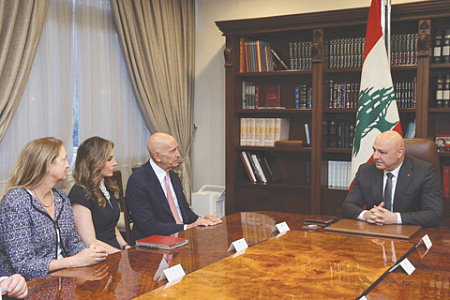
In the volatile aftermath of a devastating two-month war with Israel, Lebanon now faces a new and ominous internal threat. The powerful Iran-backed Shiite group Hezbollah is threatening to plunge the nation into civil war over a U.S.-backed plan for its disarmament. This high-stakes confrontation places the fragile Lebanese state at the center of a complex diplomatic showdown involving Washington, Tehran, and Jerusalem, with the stability of the entire region hanging in the balance.
A recent visit to Beirut by U.S. special envoy Tom Barrack laid out Washington’s vision for a post-conflict settlement. The proposal is a delicate quid pro quo: Israel would withdraw its forces from five strategic areas in Southern Lebanon, occupied since the war, but only in exchange for the complete demilitarization of Hezbollah. “The Lebanese government made the first step… now Israel must make a step in return,” Barrack stated, signaling a direct diplomatic push that will be discussed separately with the Israeli government. The American envoy also sought to reassure Lebanon’s Shiite community, Hezbollah’s core support base, that the disarmament was not an attack on them, but a chance for the group to avoid missing its opportunity.
The Lebanese government, led by President Joseph Aoun, finds itself in a perilous position. While formally agreeing to restore the state’s monopoly on armed force, it lacks the capacity to confront Hezbollah militarily. President Aoun, a former army commander, stressed the urgent need for international support to strengthen Lebanon’s armed forces, which he envisions taking the primary role in the disarmament process. He also appealed for a global effort to rebuild the war-torn southern regions, arguing that a lasting ceasefire depends on the commitment of international stakeholders to Lebanon’s recovery and sovereignty.
This American diplomatic push is seen as a direct challenge to Iranian influence. Just days before Barrack’s arrival, Iran’s top security official, Ali Larijani, was in Beirut, reportedly urging the government to resist disarming Hezbollah, a key Iranian proxy. The standoff highlights a broader struggle for control, with Washington aiming to erode Tehran’s power. Lebanese officials, such as Parliament Speaker Nabih Berri, are attempting to navigate these pressures, framing a full Israeli withdrawal to internationally recognized borders as the essential first step toward stabilization.
Adding to the volatility, the Trump administration has reportedly finalized a plan to dissolve the 10,000-strong UN peacekeeping force in Lebanon (UNIFIL). According to sources cited by ABC News, the White House views the mission as an “ineffective waste of money” that has failed to contain Hezbollah. This move, part of a broader U.S. policy of cutting UN funding, would remove a long-standing buffer in the south within six months, placing the entire burden of security on the still-under-equipped Lebanese army and raising fears of a dangerous power vacuum.
Despite losing an estimated 80% of its arsenal in the recent war, Hezbollah remains defiant. In a fiery address, its Secretary-General Naim Qassem issued a stark ultimatum: “Either Lebanon remains and we remain together, or it can say goodbye to peace.” He vowed to “fight, if necessary, to confront this project at any cost.” Lebanese Prime Minister Nawaf Salam condemned the speech as a clear “allusion to civil war,” rejecting any external dictates. His warning against “irresponsible actions that incite sedition” underscores the deep chasm dividing the nation, leaving Lebanon teetering on the edge of renewed conflict.
